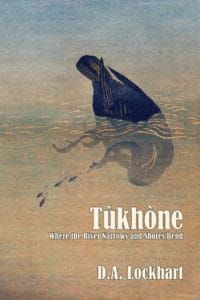 From Song Arises Verse: Notes on Pandemic Haibun
From Song Arises Verse: Notes on Pandemic Haibun
D.A. Lockhart
It is the best part of us that turns towards song when healing is sought. It is an act that forgoes words, instead seeks motion and the primal forces of melody and rhythm. Amongst the Lenape, my ancestors and relations, we have called these songs medicine. And we have turned to them time and again in our flight from genocide. And they have carried us. They are intertwined in the very fabric of our beings. We shook our ancestor’s bones with melodies and rhythms that were familiar at all the points along the Great White Way. Everything was and continues to be carried with us and within us. Such has been the case with contemporary Waawiiyaatanong.
As I sat down to finish off my most recent collection, Tukhone: Where the River Narrows and the Shore’s Bend (Black Moss Press, 2020) this fact came to me all too clearly. The final section of the collection was completed during the middle and last portions of March, where spasms of our most recent pandemic shook the fabric of our border region home. Our world closed. And as a result, I turned inward. A search that was partially driven by the need to look away from the growing human tragedy that we still face as I write this. And what I witnessed was the most basic truth: We are all products of our environment. Our ancestry runs through place. And mine was locked down into a basement office with a healthy vinyl collection and a steady feed from Detroit Public Radio. WDET, too, had returned to their musical ancestry. And like my ancestors they projected a shared past through song.
And as that exploration moved along during our newfound quieted isolation, I found that those songs anchored myself and my world in the listless chaos that has come to dominate far too much of our lives. The Haibun that followed became the concrete testimonies as to how our songs have shaped the experiences and the person I’ve become. There is a decided amount of nostalgia in them, a sentiment that is often at the heart of most every beloved song. As part nostalgia, part celebration, part mediation, these pieces sing out loud of places and moments shared. But they are most importantly in our never-ending pandemic present, an act of healing. Through them, I return to the sounds, the places, and the people that I count fortunate enough to have built a life from. These are markers and celebrations about those things we all share. But in the times that we’ve inherited must be absent from. Until we all meet again, let these songs bring us together.
D.A. Lockhart will appear in the Literary Cabaret Fri. Oct. 16 at 6:00 p.m. PDT.
